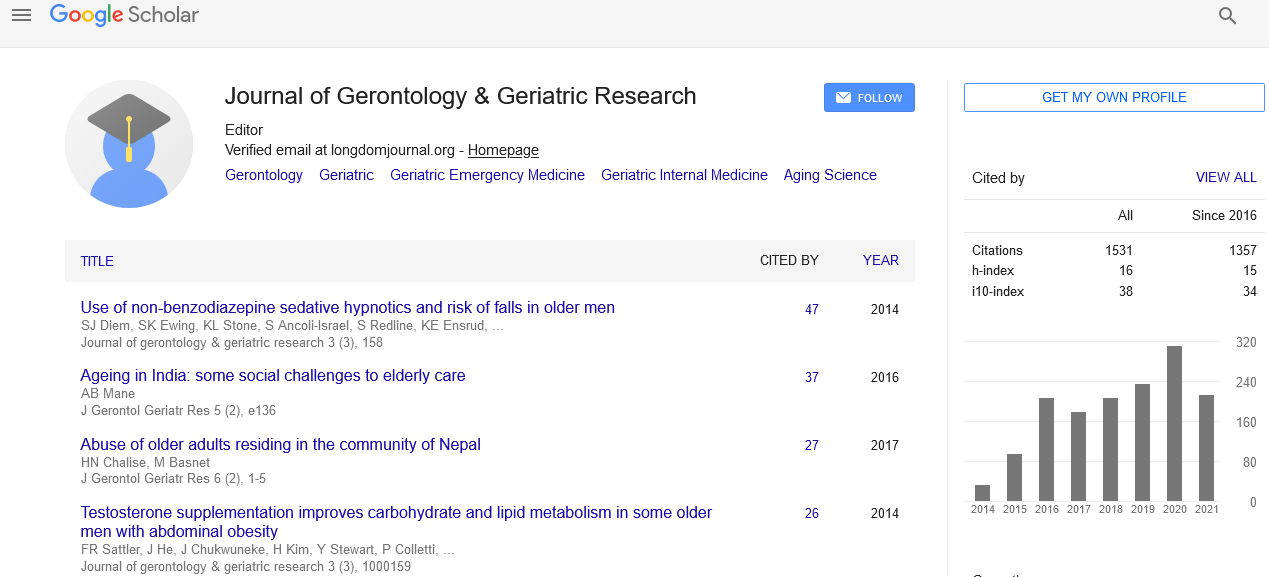PMC/PubMed Indexed Articles
Indexed In
- Open J Gate
- Genamics JournalSeek
- SafetyLit
- RefSeek
- Hamdard University
- EBSCO A-Z
- OCLC- WorldCat
- Publons
- Geneva Foundation for Medical Education and Research
- Euro Pub
- Google Scholar
Useful Links
Share This Page
Journal Flyer

Open Access Journals
- Agri and Aquaculture
- Biochemistry
- Bioinformatics & Systems Biology
- Business & Management
- Chemistry
- Clinical Sciences
- Engineering
- Food & Nutrition
- General Science
- Genetics & Molecular Biology
- Immunology & Microbiology
- Medical Sciences
- Neuroscience & Psychology
- Nursing & Health Care
- Pharmaceutical Sciences
An analysis of the direct cost burden of major chronic lifestyle diseases found in the Philippine geriatric population
2nd International Conference on Geriatrics & Gerontology
August 24-26, 2015 Toronto, Canada
Dorado Cristina2, Coronel Maria Kassandra1, Estrella Roda Tessa2, Evangelista Gienah2, Galang Emielyn Mae3 and Padre Christy Ann4
1University of Santo Tomas, Philippines 2University of the Philippines Manila, Philippines 3Saint Louis University, USA 4Far Eastern University, Philippines
Posters-Accepted Abstracts: J Gerontol Geriat Res
Abstract:
The geriatric population is a significant portion of the society and is expected to comprise 8.8% of the total Philippine population in 2015. Despite their significant number, their needs are often overlooked and many suffer from a number of diseases including chronic lifestyle diseases, which require out-of-pocket expenses for medications. However, many Filipino senior citizens are unemployed, dependent upon their pension or children to provide for their financial needs. Given the lack of financial resources of the elderly and their need for medication, it is therefore essential to assess the financial burden of medication for management of chronic lifestyle diseases on geriatric patients through direct cost studies. This study aims to determine the direct cost of medications for chronic lifestyle disease management of the geriatric population. The specific objectives of the study were as follows: 1. To identify the most common lifestyle diseases in geriatric patients in the Philippines and their corresponding maintenance medications. 2. To determines the average percent allocation for maintenance medications from the pension of geriatric GSIS or SSS pensioners. 3. To assess the government provision for management of chronic diseases of the geriatric population in the Philippines. 4. To compare the government provisions for the management of chronic diseases of the geriatric population in the Philippines with those in other South East Asian countries. The most purchased medications indicated for chronic lifestyle diseases in geriatric patients were obtained from the department of health and average costs of each were obtained from three of the largest drug stores in the Philippines and averaged. The annual percent allocation required for each of these medications by both GSIS and SSS pensioners was determined and compared to the Philippine statistics authority data on the average percent allocation for major expenditure groups of an individual living alone. Results showed that the most common lifestyle diseases and their corresponding maintenance medications were: Hypertension (Enalapril, Losartan, Losartan + Hydrochlorothiazide, Terazosin and Metoprolol), osteoporosis (Alendronate), diabetes mellitus (Glibenclamide and Metformin), peripheral vascular disease (Cilostazol), dyslipidemia (Simvastatin) and cardiovascular diseases (Metoprolol, Enalapril). Furthermore, GSIS and SSS pensioners were found to require an average allocation of 7.65% and 19.37%, respectively, for the pharmacological management of the indicated chronic lifestyle diseases, which is much higher than the percent allocation of health for most individuals (2.8%). Greater allocation for health leads to less allocation for other essential major expenditures. Results further revealed that an average geriatric patient has a much greater percent allocation (GSIS: 9.46% and SSS: 24.44%), without the government provided 20% senior citizens�?? discount. Other government policies were also analyzed and compared to other South-East Asian countries. The scope of this study was limited to secondary data which covered the direct cost of medications frequently prescribed to geriatric patients, however this study could trigger more studies which would also cover other direct costs of diseases (e.g. surgery, indirect costs) to further assess the economic burden of geriatric patients in the Philippines. Furthermore, primary data could be analyzed, such that other economic issues including poly-pharmacy could be addressed.
Biography :
Dorado Cristina is a 4th year medical student at the University of the Philippines, Manila. She is the National Officer for Research Exchange of the Asian Medical Association Philippines and was the first to develop an International Medical Student Research Exchange in her country. She has spearheaded numerous researches and projects and has been merited by the University for her excellent leadership skills, innovation and acts of service.
Email: dorado.yna@gmail.com


